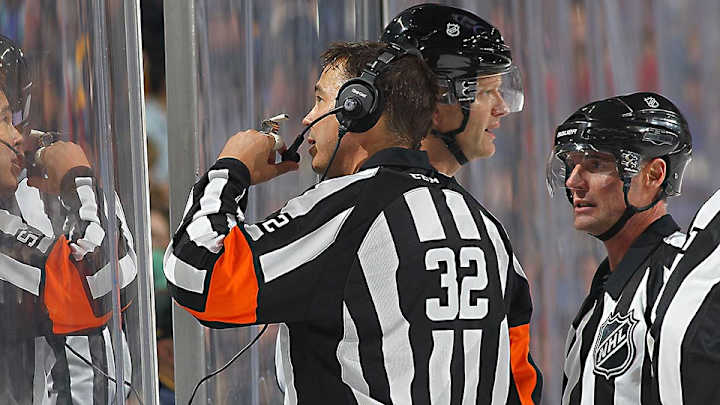GMs seeking consistency in coach’s challenge, exec compensation

The NHL’s general managers have a chance to address some nagging problems when they gather Tuesday in Toronto for their annual November meeting.
The most pressing topic is the future of the coach’s challenge, which allows for a review of goals that might have been impacted by goaltender interference or a missed offside call.
No argument that the new rule has been generally well received in the early going, coming into play 32 times already this season. And it appears to be working. According to The Canadian Press, seven of 23 goaltender interference challenges succeeded in overturning the call on the ice, while four of nine offside challenges reversed the call on the ice.
Thin 2016 crop could open Hockey Hall of Fame to Eric Lindros
What’s up for debate is the way those decisions are made. Currently, the on-ice officials make their determination in consultation with the Situation Room in Toronto after watching replays on a tablet at the penalty box. That approach was implemented as a sign of respect for the men on the ice, which is a noble goal. And for the most part it seems to be working as intended—if nothing else, the replays are demonstrating just how difficult it can be to make these calls in real time.
But at the same time, it’s allowing for some wide variations in the interpretation of what exactly constitutes goaltender interference. The letter of the law seems clear: When the goalie is prevented from making an attempt at a save by a player who is intentionally or incidentally impeding his progress, the goal should be called back. But there’s been a frustrating inconsistency in determining what qualifies as an “impeding” event, and that inconsistency is damaging the integrity of the process.
That’s not a knock on the on-ice officials. As long as there are humans making these calls, there are bound to be some differing opinions. We’ve come to grips, for instance, with the fact that a hook called at a certain moment in Game A might not be penalized at a different point in Game B.
Pelle Lindbergh’s tragic death raises tough questions 30 years later
But that’s acceptance born out of necessity. That doesn’t have to be the case with these calls. Turning them over to the Situation Room would engender greater consistency, and that should be the ultimate goal of the rule.
There also will be a discussion of the league’s executive compensation policy. The decision to award draft picks to teams that lose coaches and GMs to other teams makes sense on the surface. After all, off-ice talent is an asset to be protected just like a star player.
But where it falls short is that it allows teams to claim that compensation for “assets” they’ve already dismissed but that remain under contract.
For example, the Bruins were able to claim a second-round pick from the Oilers after Edmonton hired Peter Chiarelli, a man Boston had canned as their own GM a month earlier. Similarly, the Blue Jackets will have to send a second-rounder to the Canucks for hiring John Tortorella, a coach Vancouver had fired more than a year ago. It’s a nice deal for the teams that are “losing” this kind of asset. Not only do they gain a valuable draft pick but they get a hefty contract off the books.
That’s not how it was supposed to work.
“There was certainly some hesitation to instituting the policy in the first place,” NHL deputy commissioner Bill Daly told The Canadian Press. “It's something the commissioner was not very supportive of from the start and a little bit skeptical about how it would operate and I think some of the effects of that policy haven’t been entirely consistent with certainly the intent of the policy. It’s something that certainly warrants attention.”
Although the league has stated previously the policy will remain in place until Jan. 1—the one-year anniversary of its enactment—expect a more clearly defined version of the policy to be drafted here that can be implemented after that date.
The numbers game
• Tonight, Alex Ovechkin will try to break Sergei Fedorov's NHL career mark for goals by a Russian player (483) and he’ll be in Detroit with the newly inducted Hall of Famer on hand. Fedorov will be honored by both clubs before the game.
NHL games to watch: Ovechkin’s shot at history; Roy returns to Montreal
• At 10-3-0, Ovechkin’s Capitals have matched their best 13-game start to a season in the franchise’s 41-year history. The 1991-92 team coached by Terry Murray and boasting such notables as Peter Bondra, Dino Ciccarelli, Dale Hunter, and Rod Langway also started 10-3-0.
• The Rangers at 10-2-2 have tied their best 14-game start to a season in terms of points (22) in the franchise’s 89-year history. Their 1971-72 club (9-1-4) and 1990-91 edition (11-3-0) share the mark.
Hot links
• Carey Price has left Montreal seeking a medical evaluation. The team wouldn't comment further, but hard to see that as a positive step in his recovery from a lower-body injury.
• A former goon-turned-hall monitor, newly minted Hall of Famer Chris Pronger has found a new way to impact the NHL.
Report: Coaches re-hired after OHL's Flint Firebirds walk out
• The nepotism that led to the walk-out by the OHL’s Flint Firebirds Sunday night is far from an isolated incident in sports.
• Joe Pelletier collected four great stories about the effects of war on hockey.
• The Edmonton Oilers believe they’ve outplayed their opponents all season. So why are they still last in their division?
• Kurtis Gabriel began playing hockey full-time just five years ago yet he’s about to make his NHL debut tonight with the Minnesota Wild. He seems like a pretty impressive guy.
